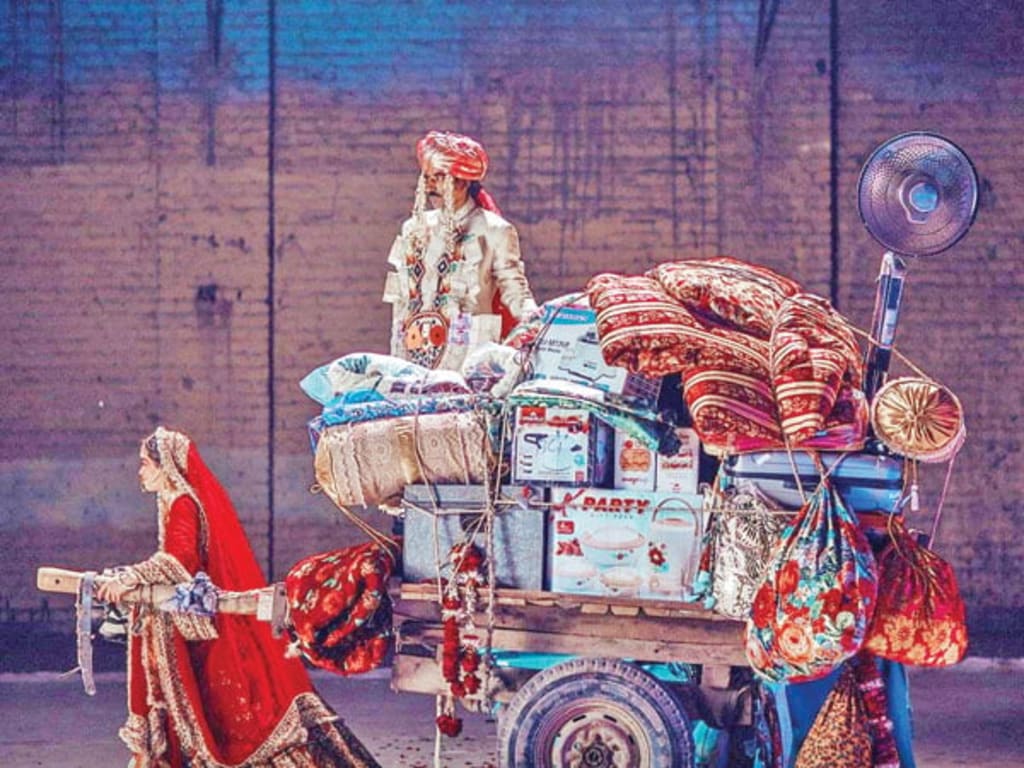
The aroma of authentic Pakistani cooking permeates the entire room. The setting is one of joy and fun with dazzling accent lights. With wide smiles on their cheeks, the bride is surrounded by her cousins, aunts, and friends. The bride, who is absolutely beautiful, is in the centre of all of this excitement. Knowing that this day will transform her life for the better, she looks at you with a mixture of joy and trepidation in her eyes.
But in the midst of all the joy, something begins to cast a shadow over the good times. It's a sorrowful note in a cheerful song because it's about dowry. It serves as a sombre reminder to everyone that in order to preserve love and happiness, things must change and customs must be reconsidered.
Imagine a young bride dressed in traditional garb, her eyes shining with visions of a happy future. But a whirlwind of feelings, including dread and hope, are hidden behind those eyes. Many Pakistani brides experience worry as they travel from the wedding location to their future house because of the dowry that they must carry on their frail shoulders. Families are frequently forced into financial difficulties by the pressure to satisfy exorbitant dowry demands, forcing them to borrow money, sell off assets, or even turn to unscrupulous ways to meet these demands.
There is no calculating the emotional toll on brides. They are examined when they enter their new homes, not for the love they bring, but for the worldly belongings they carry. Their value is entwined with the value of their dowry, obscuring their uniqueness and goals. This harsh reality of treating brides as commodities, with their value determined by their financial worth, is at odds with the ideals of equality, love, and companionship.
Dowry-related violence…
In Pakistan, the practise of dowagership has a long history, but for many women, it has turned into a curse. The practise of demanding and offering dowries has increased in popularity recently, which has resulted in a substantial increase in dowry-related violence and fatalities.
The Human Rights Commission of Pakistan estimates that dowry-related violence claims the lives of over 2,000 women annually. Although it might be significantly greater, the typical dowry in Pakistan is about 500,000 Pakistani rupees. Sometimes, the bride's family is unable to afford the dowry that the groom's family requests. The groom's family may use violence, threats, or even murder if the bride's family is unable to comply with their demands.
There are many reasons why dowry-related violence is so common in Pakistan. One reason is the strong cultural belief that the bride’s family is responsible for providing a dowry. Thousands of families find themselves entangled in financial burdens, often resulting in a distressing number of dowry-linked deaths and suicides.
Ironically, the dowry system resembles a well established custom that is challenging to abandon. It is similar to a never-ending cycle. Even well-educated and contemporary families begin saving money as soon as a daughter is born in order to provide a sizable dowry when she marries. This can put families under a lot of stress and have unpleasant consequences. Even those who publicly declare their opposition to the dowry system occasionally give in to social pressure and provide dowry in the pretext of gifts.
The Pakistani government has attempted to address the problem of dowry-related violence in some way. To control and reduce the harm that this long-standing practise causes, legislative measures have also been adopted.

However, there are still issues with this law's knowledge and enforcement. Despite legislative protections, dowry-related cases frequently go unreported or unsolved because of cultural pressure, a lack of awareness, and poor implementation.
AN OFFENSIVE PRACTICE CALLED ‘DOWRY’…
A 2019 survey from the women's rights group Aurat Foundation found that 86% of Pakistani women have suffered violence at some point in their lives. Even more tragically, the dowry problem can make a woman's own home—where she should feel the safest—her most perilous environment.
The unfortunate problem of violence against women, which also includes damaging acts like rape, acid throwing, burning, and other forms of domestic abuse, includes deaths resulting from dowery. The age of the victims of dowry-related violence is typically 22 years old.
The reasons for dowry violence are complex and varied. However, they often stem from the belief that women are a financial burden on their husbands and in-laws. The groom’s family may demand more and more dowry, and if the bride’s family is unable to meet their demands, the woman may be subjected to abuse.
In Pakistan, the practise of dowry is forbidden. However, the law is frequently not upheld, and many dowry violence incidents go unreported. A survey by Gallup & Gilani Pakistan in 2021 found that while 38% of respondents said they would not engage in the tradition of giving or receiving dowries, 53% of respondents said they would like to. These study results reveal the nuanced feelings about dowry in Pakistan, which reflect a range of viewpoints and attitudes among the community. It is alarming that 53% of respondents still say they want to engage in dowry despite the fact that society is becoming more aware of this problem. This high percentage demonstrates how firmly ingrained the practise is in
On February 15, 2022, Ayesha was discovered dead in a water tank at her Karachi residence. Her spouse and her in-laws were detained on murder suspicion. According to the police, Ayesha was killed by being strangled. Ayesha was allegedly subjected to physical and psychological abuse by her husband and in-laws, who had been pressuring her family for more money.
Another dowry case that was highlighted in the media was of Fatima. She was burnt to death in the kitchen of her home in Lahore on January 20, 2021. Her husband and in-laws were also arrested on suspicion of murder. The police said that Fatima had been doused in kerosene and set on fire. An esteemed newspaper reported that Fatima’s husband and in-laws had been unhappy with the dowry that her family had given and that they had set her on fire in a fit of rage.
Another reputed newspaper reported a dowry-related case that took place in Rawalpindi on December 15, 2020. Zainab’s husband and in-laws had been threatening to kill her if she did not bring more dowry, and they had strangled her to death when she refused. Zainab was strangled to death in her bedroom; her husband and in-laws were also arrested on suspicion of murder. The police said that Zainab had been strangled with a rope.
These are few of the cases of dowry deaths that occur in Pakistan every year. Hundreds and thousands of cases of dowry violence go unreported due to fear of retaliation from the perpetrators or due to the lack of trust in the police and the justice system.
What people say…
Many think that changing this culture will require empowerment and knowledge. Salman, a father of three girls, imagines a time when discussions on women's accomplishments and goals will take the place of dowry issues. He highlights that "we need to raise our daughters to be independent and proud of their accomplishments." "The best gift any father could give to their daughter is the gift of education and make her self-independent," he continues.
“It’s heart-wrenching to see a marriage dissolve over material possessions,” Ikram, a married man in his thirties, recalls how he saw his cousin’s marriage crumbled under the weight of dowry-related conflicts. He believes dowry is a potential barrier to genuine emotional connection and compatibility.
AN OFFENSIVE PRACTICE CALLED ‘DOWRY’…
While Nida sees dowry as a symbolic connection to generations past, acknowledging the role it plays in preserving cultural identity. “Our ancestors held this practice with respect, and there is a reason why they practiced it: to ensure the financial stability of their daughters.”
Similarly, Mariyam, a married woman, states, “It’s a gesture that parents make to ensure their daughters have a strong start in their new life.”
Meanwhile, Zain, another young man in his twenties, advocates that marriage should be about shared values and companionship, not about money and materialistic possessions, “The focus should be on building a life together, not on the monetary value of possessions.”
On the other hand, Shahid, who adheres to more traditional beliefs, argues that the dowry system has its merits. “In our society, it’s a way of ensuring that a newly married couple starts their life on a stable footing,” he points out.
“The idea that a woman’s value is tied to what she brings to a marriage is fundamentally flawed,” expresses Ahsan, a software engineer by profession. He sees the dowry system as solidifying harmful gender stereotypes, where women are reduced to commodities and their worth is measured in material possessions.
“In a society where financial stability matters, dowry can offer a practical foundation for a couple,” elucidates M Kamran, a father of two daughters and a son. His viewpoint underscores the idea that dowry can provide a safety net for the newlyweds as they embark on their marital journey.
However, Sana, who recently got married and chose a simple nikkah ceremony, believes that marriage should be about love and companionship, not transactions.
On the other hand, Khoula, a mother of two daughters, acknowledges that dowry has practical implications. “In a society where financial stability matters, dowry can provide a safety net,” she stresses.
Nadia, a young girl, emphasises the importance of balance so that dowry helps newlyweds and support their future instead of being all about extravagant displays. “We should move away from lavish displays and focus on essential support,” suggests Nadia.
Say no to dowry
Despite the burden of tradition and societal expectations, rebellion is starting to gain ground. Many Pakistanis are resisting the constraints of dowry thanks to education, awareness, and a desire for change. Organisations and activists are working nonstop to promote legislative reforms and increase awareness of the negative impacts of dowry. Their conflict aims to reinterpret marriage as a union founded on respect, love, and equality for both couples.
About the Creator
Samira
25 years young.
inspired creative, enterprenuer and lover of life.
expressing herself through words, songs, images and sounds. writing her story daily, putting meaning to her path.
Welcome! :-)






Comments
There are no comments for this story
Be the first to respond and start the conversation.